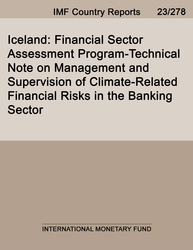
Iceland: Financial Sector Assessment Program-Technical Note on Management and Supervision of Climate-Related Financial Risks in the Banking Sector
Iceland: Financial Sector Assessment Program-Technical Note on Management and Supervision of Climate-Related Financial Risks in the Banking Sector
READ MORE...
Volume/Issue:
Volume 2023
Issue 278
Publication date: July 2023
ISBN: 9798400248955
$20.00
Add to Cart by clicking price of the language and format you'd like to purchase
Available Languages and Formats
| English |
Prices in red indicate formats that are not yet available but are forthcoming.
Topics covered in this book
This title contains information about the following subjects.
Click on a subject if you would like to see other titles with the same subjects.
Banks and Banking , Exports and Imports , Finance , Money and Monetary Policy , International - Economics , Environmental Economics , climate-related financial risks , government initiative , EU norm , Climate-Related Financial risk , Iceland's strategy , Climate change , Commercial banks , External balance assessment (EBA) , Credit risk , Global
Also of interest
Summary
The Icelandic authorities are committed to addressing climate change issues and reaching ambitious objectives to reduce GHG emissions. Iceland is naturally exposed to significant natural hazards, such as volcanic eruptions and extreme weather conditions. The country is also exposed to physical risks resulting from climate change, such as sea acidification and melting glaciers (a long-term risk), as well as climate change transition risks, for instance, concerning the fisheries and transportation sectors. Still, Iceland can leverage its unique assets to overcome challenges of adapting to climate change. One asset is Iceland’s abundant domestically produced renewable energies that cover nearly all the country’s heat and electricity production needs. The 2020 Climate Action Plan and the 2021 Iceland’s Strategy on Adaptation to Climate Change include ambitious objectives toward GHG emissions’ neutrality.
Copyright © 2010 - 2026
Powered by:
AIDC



